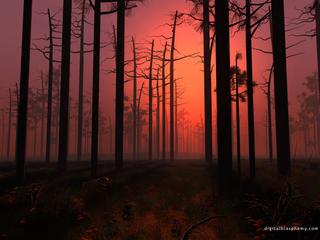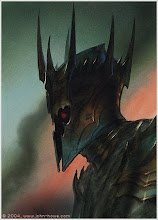The 12 Year Quest

So what to do?
I start reading on every religion extant in the world: Buddhism, Islam, Hinduism, Sikhism, Shinto, Paganism, Gnosticism, Judaism, anything.
And the more I read, the more I investigated, the more I talked to people about their respective religious beliefs, the more I migrated toward Athiesm.
Perhaps this is the sound of an idiot, all fury and wind amounting to nothing.
I started reading Socrates, Spinoza, Kant, Schopenhauer and Nietzsche. I began to apply their results to my life, and I realized in the end that I would be happier if I was told an unhappy truth, than a happy lie.
I embraced a kind of optimistic pessimism, an idea that I know the truth is painful (there is no God, there is no afterlife, this is all we have) but I am optimistic despite these truths. I can no longer bank on an infinite justice, I have to make my own. I can no longer rest in the faith of a god who will fight for peace and righteousness, for there is much needless tragedy and suffering in the world. I am left with the Epictetan dilemma: Is god willing but unable to do good? Then he is a limited being. Is god unwilling but able to do good? Then he is a monster. Is god unwilling and unable to do good? Then why worship him? Is god willing and able to do good? Then why is there evil in the world?
Of all these possibilities, I choose the first option. If there is a god, and the odds are that there isn't, then he must be a very-powerful but not omnipotent being. How else to reconcile the deep desire of a benevolent being of authority and the Holocaust, the Middle Passage, the Inquisition, terrible tsunamis, hurricanes, tornadoes, earthquakes and other natural disasters that visit terror and death to the innocent as well as the guilty?
In the past few years, in the silence of the flurried storm of doubt which permeated my existence, a quiet familiar voice echoed into my brain. It was a tale of Yoni the Circle-Maker in the Babylonian Talmud. It was in a book called "The Book of Jewish Wisdom" from the Tracy City Library and no other book on any other religion intrigued me or forced my acute attention more than these snippets and excerpts taken from the Babylonian and Jerusalem Talmud. Soon, I was back to reading the Bible - but only the Old Testament - The Tanakh. Then I started studying Hebrew, because I wanted to read the Tanakh in its original language, just as I had learned Latin and Koine Greek in the seminary in order to understand the true meaning of the New Testament.
After twelve years of wandering, and five years of studying Judaism, I almost convinced myself to become a convert to Orthodox Judaism.
Almost.
I never spoke to a rabbi despite many who told me I should have. But a strange thought occured to me. If being Jewish doesn't guarantee heaven - i.e. anyone who is righteous could attain paradise, and Jews aren't given special treatment in heaven despite their being 'chosen people', then why should I belabor myself with 713 mitzvot to keep rather than the 7 commandments that a Son of Noah (anyone who is not Jewish is a Son of Noah, Jews are Sons of Abraham)must keep? There is also the added threat that I may backslide once I commit to becoming a Jew. And I do not wish to injure my friends in this way. Therefore, I believe the best way to help the Jews is not to become one, and so I remain B'nai Noach.
I keep the seven commandments given to Noah after the Deluge and I strive to be as righteous as I am able. I respect the Jews as well as any person who is true to their beliefs.
Thus, I have come not quite full circle, perhaps a helix, but I do not begrudge my journey nor have any regrets in taking it. I am a better person for it, I think, and if more people would question their beliefs and explore the truths which bind us rather than stay constrained in their limited universes of cave-shadows, I believe that this world would be a much better place, a world more fit for a messiah to visit.


2 Comments:
Isn't it amazing how Faith, through cultural conditioning, has become so embedded in our dna makeup that we've even evolved a specific gene for belief. Scientists refer to it as the 'God Gene'. Which is why so many either except faith or struggle internally with the consequences of no faith. 12 years is a longtime my friend (you should've listened to me 20 years ago)! As a lifelong aethiest, I was very amused when my 8 year old, while discussing Noah's Ark, asked, "After the Ark landed what did the lions eat?" I thought, "Yes! How simple it is!" I am constantly enthralled with the simplicity of life that we humans complicate in self-indulgent arrogance. The need to 'believe' is so great that we spend endless amounts of effort and time contemplating and analyzing the specifics of science and religion to either confirm or deny that Faith. When all we need to ask ourselves is "What did the lions eat?".lol
--Mondo
What if there is a very powerful, actually all powerful God? But, what if He allows a choice? A choice to either accept the creator as being omnipotent or to be our own god. People who choose to be their own god are going to have an impact on others, it is human nature. Human nature will even make accepting God as omnipotent difficult, on a daily basis. But, left to our own devices, human nature will take us to a point of destruction. So, does anonymous/Mondo believe that God created the heavens and the earth, but that there was an issue with what to feed the lions when the ark landed?
I see you first posted this back in 2005. What are your thoughts on this topic now?
Post a Comment
<< Home